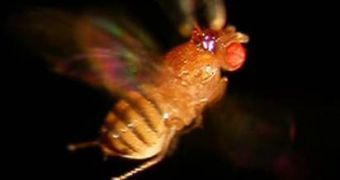It seems that even microscopical brains have free will. Or at least a behavior that may hint at it, as in the case of the minute fruit fly, new findings could explain the nature and evolution of free will in humans.
If researches could develop robots with free will, it "may lead to more realistic and probably even more efficient behavior, which could be decisive in truly autonomous robots needed for planetary exploration." said neurobiologist Bj?rn Brembs from the Free University Berlin.
"Better understanding aspects of free will in humans also could aid in the treatment of mental disorders where people face problems controlling how they feel, think or act, such as depression, obsessive-compulsive disorder, anorexia nervosa, schizophrenia or attention deficit hyperactivity disorder," Brembs told LiveScience.
Whether humans possess free will or not (in other words, control for their own actions) has been a vivid debate for centuries.
"Free will is essentially an oxymoron - we would not consider it 'will' if it were completely random and we would not consider it 'free' if it were entirely determined," Brembs added.
Thus, nobody could confer responsibility to one's actions if they are the result of random coincidence but if one's actions were completely influenced by external factors, leaving no alternatives, that person could not have been responsible for them.
"We speculate that if free will exists, it is in this middle ground between randomness and determinism that is currently not well understood or characterized," said mathematical biologist George Sugihara at the University of California at San Diego.
Animals are often regarded "as very complex robots," whose behavior is triggered just by reactions to the external factors and different responses to the same outside factors are attributed "to random errors in a complex brain," Brembs added.
That's why Brembs's team supposed that if fruit flies were just reactive robots, in rooms lacking any factor variation they would fly in a chaotic way, completely randomly.
The flies were glued to small copper hooks (but they were still able to beat their wings and turn) in totally white environments, leaving them devoid of any visual clue. Computer analyses showed that the flies moved back and forth over a time period in a manner which was not random.
"Their behavior seemed to match up with a mathematical algorithm called Levy's distribution, commonly found in nature. Flies use this procedure to find meals, as do albatrosses, monkeys and deer. Scientists have found similar patterns in the flow of e-mails, letters and money, and in the paintings of Jackson Pollock," Brembs said.
This behavior emerged spontaneously, not triggered by external factors, being situated somewhere between random and determined, "and could form the biological foundation for what we experience as free will. This function appears to be common to many other animals." Sugihara added.
This requires "a complex decision-making processing underlying behavior. This seems a necessary condition for free will." said neuroscientist Gonzalo de Polavieja at the Independent University of Madrid.
Brembs did not believe that the insects actually posses free will, per se, nor the findings could reveal free will in humans or animals.
"We only showed that brains might possess a faculty which free will could potentially be based on. The degree of spontaneity that animals evolve could be linked with the niches they occupy in nature," added Brembs.
"There is a hypothesis out there which claims that only the flexible birds [with more spontaneous behavior] remain in a seasonal habitat, while less flexible, stereotyped or deterministic birds migrate. Animals in very tightly constrained niches, such as maybe gut parasites, have among the most deterministic behavioral repertoire compared to other animals, because any variation in behavior might be deadly. Flies are somewhere in between the extremes." explained Brembs.

 14 DAY TRIAL //
14 DAY TRIAL //